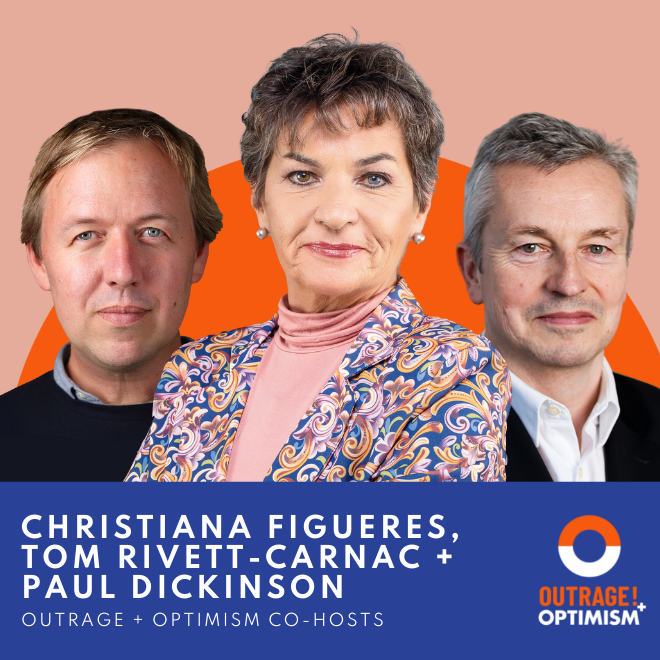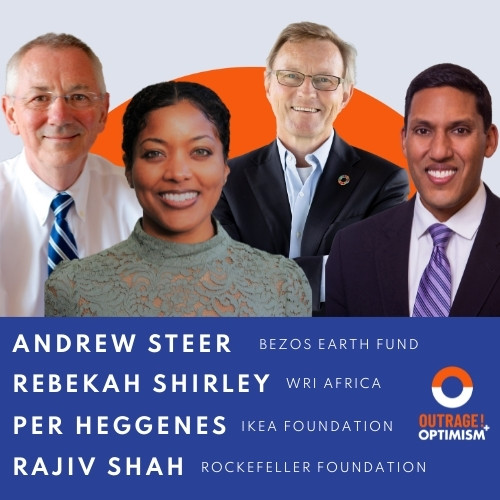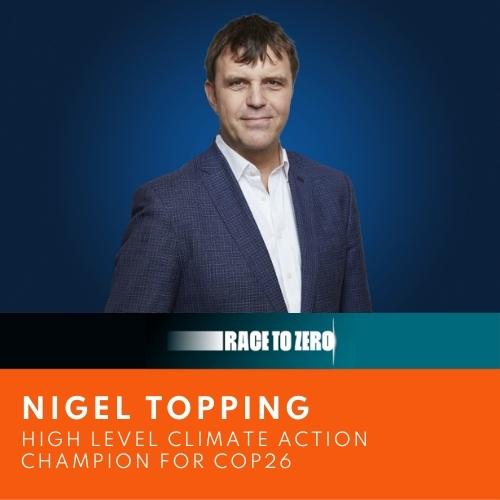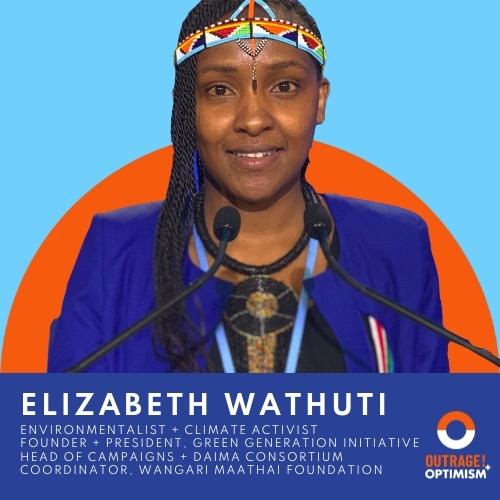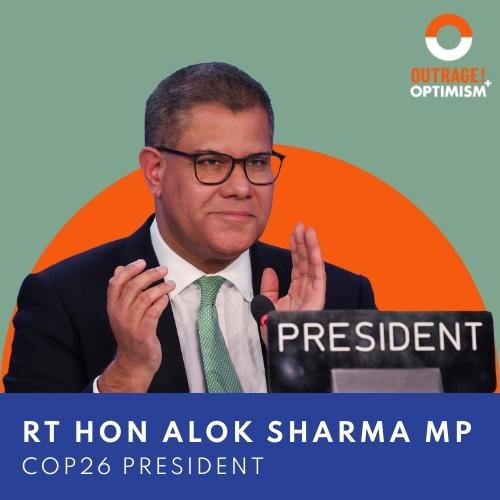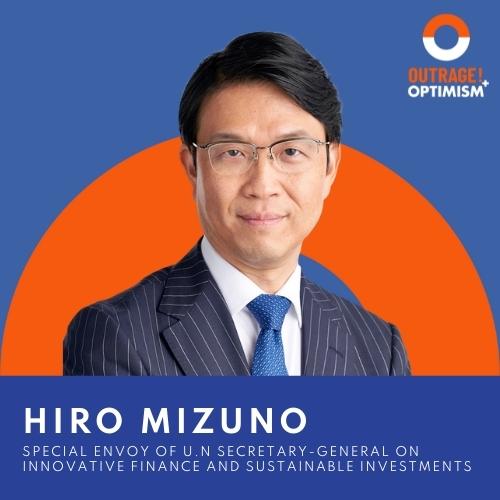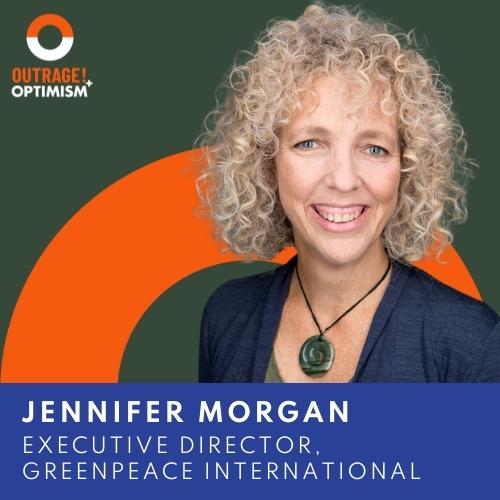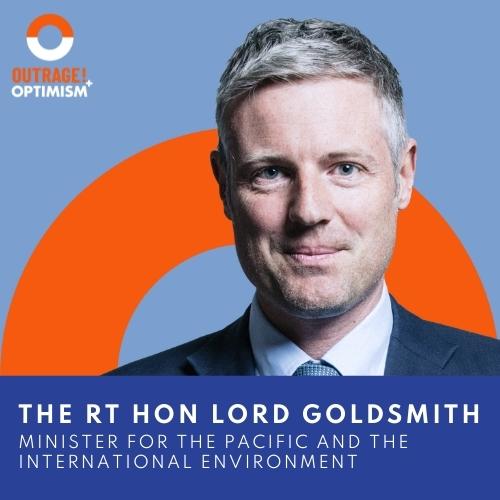123: Ramping Up for COP26! with Matthew Phillips
If you haven’t heard, COP26 is about to happen.
About this episode
This week we embrace the complexity that is a COP (Conference of the Parties), and try to frame what is going to happen in the next 2 weeks so we don’t lose focus on limiting global heating to 1.5C.
We’re joined by Communications Director of COP25 & COP26 Climate Champions, Matthew Phillips. Matthew is inextricably linked with the process of COP26 and shares his wisdom and unique insight into what a successful COP26 looks like.
So if you’re thinking about the logistical nightmares of COP26, what the Heads of State might say, how NDCs are going, or how inequities are being addressed at the COP this year, this conversation is for you.
Stay til the end for a beautiful soundscape of children’s voices from Positive Imaginings.
—
Links mentioned in the show:
- Watch: TED Countdown
- Learn more: Rowanbank Environmental & Arts Education
- Listen: Positive Imaginings Children’s Soundscape
- Race to Zero: Twitter | LinkedIn
- COP26 - UN Climate Change Conference: Twitter | Instagram | LinkedIn
- High Level Climate Champions: Twitter
Watch
Full Transcript
Transcript generated by AI. While we aim for accuracy, errors may still occur. Please refer to the episode’s audio for the definitive version
Tom: [00:00:25] Hello and welcome to Outrage + Optimism. I'm Tom Rivett-Carnac.
Christiana: [00:00:28] I'm Christiana Figueres,
Paul: [00:00:30] And I'm Paul Dickinson.
Matthew: [00:00:32] And I'm Matthew Phillips.
Tom: [00:00:35] Yay! Alright so this week it’s all about Glasgow
Christiana: [00:00:36] Who is this Matthew Phillips?
Tom: [00:00:40] You’re going to find out all about Glasgow. Thanks for being here. Okay, friends, this is it, this is our last episode before the world meets in just a few days in Glasgow. We're all on our way. This is going to be a very consequential moment for the world and for the future of it. It is the three of us here as host and we have a very special guest. You may not know who Matthew Phillips is, but he has been right at the heart of many of the most consequential things that have happened on climate over the last few years, when Christiana Figueres asked me in 2013 to put together a ninja team of people who could help us get out of that. And since then, right now he is also at the heart of Nigel Topping’s team as part of the race to zero and the climate champions. Matthew, welcome to outrage and optimism. It's great to have you here.
Load MoreMatthew: [00:01:34] Thank you. I'm so psyched to be here. I’m the biggest fanboy of this show, and I've been waiting for the call. So I’m just delighted to be with you all.
Tom: [00:01:40] You've already got very high marks, I have to say.
Paul: [00:01:43] But there was talk of putting the gang back together, right? Because Christiana and Tom and Matthew were this inseparable team in 2014 and 2015, and I'm just so excited to see you all. It kind of makes me a bit soppy, just saying.
Tom: [00:01:55] And you were always part of it too, Paul.
Paul: [00:01:56] I know, well..
Tom: [00:01:59] I know you officially were.
Christiana: [00:02:00] Yeah, yeah, yeah. Paul was fishing for that one. You got it Paul.
Tom: [00:02:05] Now we have got a lot to cover. Glasgow is complicated and there's an enormous amount riding on it. But I just want to start, you know, in two weeks, three weeks, we will be at the other end of this. Everyone will have gone home and something will have come out of it. So let's just start by saying, where do we want to be in two and a half, three weeks time? Who wants to start?
Christiana: [00:02:25] Well, can I start by saying we do not want to be?
Tom: [00:02:28] Sure why don't start that? Yes.
Christiana: [00:02:31] So we do not want to be in a situation in which we, the global we, would conclude that 1.5 is no longer reachable as a maximum temperature increase. The other way of saying that is we want to be in the situation of saying 1.5, we know has to be our our north, our end point destination and it is still alive. It is still in the running. The reason why I think those two things need to be put out there is because I have heard from many and it's a very understandable anxiety and concern that they would want COP26 to guarantee that we're on a path to 1.5. And as we know from so many reports that have come out about emissions growth and emission reductions, COP26 is realistically or in fact, even magically not going to guarantee that we're on track for 1.5. What we can expect and is still a stretch, frankly, definitely still a stretch, but is doable with a lot of work and a lot of political flexibility from many heads of state is to keep 1.5 alive. Now we do know that the COP presidency, as well as many other countries, especially the Climate Vulnerable Forum, which are many countries around the world where the most vulnerable, in view of the fact that the COP cannot guarantee 1.5 as maximum increase, they're actually putting on the table the possibility that countries come together again in 2023 to be able to harvest what has been achieved over the next two years in terms of technology policy, financial shifts, et cetera, and then be able in 2023 to say right now we really are on track to 1.5. That would be an amazing agreement because right now there is no multilateral agreement for that. It is allowed under the rules of the Paris Agreement, but there is no specific agreement to call for that in 2023, but rather five years from now in 2025. So a very interesting, I think, proposal, especially from the most vulnerable countries who understand that for them, 1.5 is definitely what keeps them alive and surviving, and hence, I think a very interesting political move on their part, to put that on the table even before the cop starts.
Tom: [00:05:31] Hmm. Matthew.
Matthew: [00:05:32] Well, Tom, I'd also like to take Christiana's lead and not actually answer the question you asked. Rather than think about, but not necessarily in a direct way, what do we need going into COP, right? And I think that's a really important kind of contextual background to think about how we get to that outcome. And I was like looking back at all the emails nostalgically from Paris. And obviously, we live in the solipsism of our moment and we think Glasgow is the hardest moment that we've ever been in. But actually, in reality, looking back and reflecting on these emails before Paris, you know, we were asking questions like, are we going to get an agreement? And then we went into it with all of the optimism that we need to. So I would say that in this really difficult moment befor Glasgow, we need to reflect back on that and actually, first and foremost, have the belief going into it that we can do that, that we're going to come out in the right direction keeping that 1.5 alive.
Christiana: [00:06:27] More than belief, conviction Matthew.
Matthew: [00:06:32] Fully fully agree.
Paul: [00:06:37] We can. We must. We will.
Tom: [00:06:39] Oh yeah, absolutely. Paul, what do you think?
Paul: [00:06:40] Yeah, no no this is...
Christiana: [00:06:41] I'm sorry, did I cut you off? Sorry, Matthew. So let's continue.
Matthew: [00:06:47] Let's reframe that to the conviction that we can get this done.
Paul: [00:06:52] Yeah, well, I mean, I remember you giving a brilliant TED talk, Christiane, after Paris and you explained where it all started and it was started with optimism. So I think it is interesting to recognize this. We were talking last week about how kind of you see what you describe, but you probably, you know, become what you believe, that famous phrase, you know, if you think you're going to succeed or if you think you're going to fail, you're probably right. So in answer to like, what we want, do you have an answer, Tom?
Tom: [00:07:15] Well, I mean, I think it's been encapsulated very well. It has to be 1.5 is still alive and that may be some substance. And the places where the substance is really hard, there may be a process to fill in for the gaps, right? So we get as far as we can, then we have a process by which we solve in the next couple of years. We have to accept that it's not going to be enough for everybody. And that's fine, right? Everybody plays a role, but actually that is an enormous achievement to get us there. Now we also think one thing we should cover in this podcast is the COPs are strange creatures, right? And actually, people come at them from the outside and they think it should agree things like the end of fossil fuels or it should agree, you know, other different elements that are important in our transformation. But they're very structured. They have a particular set of rules and they do specific things. And I thought it might be quite helpful now that we know what the outcome is, that we want 1.5 is still alive, to take people through what's actually going to happen, the types of commitments. And I thought the best way to do that would be to make Paul explain it and then we can judge how he does.
Paul: [00:08:08] That's so unfair, because I'm so deeply, deeply unprepared, but I'm going to have a go just because I've been given a briefing and you could just kick me off and start working with Matthew because he's younger and more charming than me. So with that risk, the goal of COP26 is very simple. It's to keep the hope of 1.5 alive. There are not really any substantial new agreements to be made in terms of the fact that the Paris Agreement set up the process about ratcheting up nationally determined contributions. The conference is very big. Twenty five thousand people are all coming. Heads of state will give their lead in to it and set it up. There are notable absences, you know, Russia's Vladimir Putin, Brazilian President Bolsonaro, President Xi. But although he hasn't officially declined yet, you know the big issues that are expected to rise up at COP26 are the levels of ambition, published in the NDCs. That's absolutely critical. That's what the whole thing is about in the sense. There will also be discussion of equity, about emissions reductions that are required. The role of China. There are Article six issues related to coming up with a basic format for some kind of UN administered carbon markets and the issues of nature based solutions. So I think on balance, I've done a fantastic summary of really just bringing us in and up to date and and sort of 10 out of 10, really?
Tom: [00:09:30] Matthew, how did Paul do at reading our briefing?
Matthew: [00:09:33] I think paused on an extraordinarily good job of just describing just how complicated the Glasgow outcome is and how we unpack the 1.5, right. So the distinction between Paris and Glasgow, or one of them, is that there's no big deal at the end that we arrive at. There's no big conclusion moment. So the question is it's going to be open to interpretation. And how therefore do we describe if we've kept it in our sights? So it's not just going to be about net zero by 2030, but the transformations that we can make by 2030. It's going to not just be about the NDCs that Paul mentioned, but specifically these real economy transformations that we can make right now by 2025. It's not just going to be about the hundred billion, but equally about...
Paul: [00:10:18] The billion a year. It's very much a billion, a hundred billion a year.
Matthew: [00:10:21] Yes, but the trillion that we need in terms of private finance allocated. So it's much more multifaceted. And how do we unpack all of that? And one of the things that I've been reflecting on actually over the course of the last couple of weeks is that we really need trust reaffirmed in the action. And I think that if we can kind of re-engage that element of trust in all of these items I mentioned then then we might be within spitting distance of getting to where we need to get to.
Tom: [00:10:48] And how do we? That's a really interesting thing you just said there, Matthew. I mean, how do we get our arms around the outcome? Because as you said, it's not about an agreement, it's about a series of nationally determined commitments, which some of which have been made already and maybe some will be made in Glasgow. It's about a whole range of other things, including non-state actor ambition. Will it be clear at the end of Glasgow what we've achieved or will it just be a mixture of different things that we'll have to look at and interpret?
Matthew: [00:11:16] It's going to be a bit of a holistic package that I think we need to assemble in terms of the media, the climate community that is going to be the echo chamber around Glasgow. So it's going to be a difficult thing for, I think the public to understand, which is why it's our role and particularly all of the people that are probably listening into this podcast to describe what that looks like, both from, I mean, I think, Christiana, I think I've heard you describe it as the triangle, right? The tripod of governments, on the one hand, what are they committed to? And the second part of the triangle is going to be around the private sector and the real economy. What's actually happening now; are the accountability and implementation mechanisms in place. And then thirdly, is civil society, kind of, recognizing this and acknowledging that this might not be the end game, but is a, kind of, stepping stone on the way to achieving the goals of the Paris Agreement? So I think it's about extending those kind of three different corners of the triangle.
Christiana: [00:12:06] And if I can come in to complement that, Matthew, you have very clearly articulated why it is going to be impossible for anyone to decide that there was or was not success. Because success is easier to measure and to decide if you have a, let's say, a binary situation in which either you have a multilateral agreement or you don't, which is the situation that we had in Paris, and that is not what we have here. So ultimately, what we're going to have here from COP26 rather than success is progress. Now the difficulty of that is that progress in and of itself is in the eyes of the beholder. So there will be many people who will opine that the progress made at COP26 is actually substantial. It will not close the gap, as we know, but one could say actually pretty admirable progress. There will be many who will say completely insufficient, completely insufficient given where we are in this decade, given where we are with science, given where we are with human pain and with destruction and with biodiversity loss. Completely insufficient. And I think even before we go into the COP, we have to know that both of these will be stories that come out of the COP. And probably the content of this story will be more of a reflection of the teller of the story than of the story itself than what we have at the COP. Because it's going to reflect people's perspectives, all of which, by the way, are absolutely true and all of which are equally valid. It's not that one perspective is going to be more valid. This is again one of those very complex situations in which we, as observers of this, have to hold all of those realities in equal standing because there's no way that we can say one perspective is correct and the other one is wrong. Actually, they're all correct. So welcome to complexity,
Tom: [00:14:30] But that's a really good point, Christiana. And I suppose one call that we might make to those people who will be shaping the opinions of the world out of this cop is to embrace that complexity. This is going to be a COP that excuse simple headlines and conclusions of success or failure. And that's a really difficult thing for the media to do. But I actually think the media is increasingly responsible around this issue and wants to tell those stories well, so I really hope that happens. Now, should we turn, there's quite a lot of other substance here, and one thing that we should be aware of and Matthew, you're much closer to this than any of the three of us is, this has been a nightmare to organise. I mean, trying to organize tens of thousands of people coming together safely in the midst of COVID, we should all be aware of just how difficult that's been. But is there anything we want to share with listeners about the upcoming logistics? Because many people who are listening to this will no doubt be coming to Glasgow.
Matthew: [00:15:23] Yeah, I mean, I mean, you're right to flag it, it's been a COP unlike any other in the sense that we're doing it in the middle of a global pandemic. So huge hats off to the UNCCC the COP26 presidency, that's had to kind of map out a way to do this and to stage this thing in Glasgow. It is obviously going to change the environment of how the COPs are actually going to play out. So I want you to imagine, obviously, what a COP is usually about. It's usually about dialogues and conversations and mutterings in the corridors between delegates. And I think,
Christiana: [00:15:56] Hold it Matthew. And about huddling in the back of the room, you know, 50, 100 people huddling in a very tight space until they get agreement about something. Huddling is not COVID friendly.
Matthew: [00:16:08] Yeah, huddling is obviously so important to kind of a successful COP or not. And, Christiana, as you were saying that, I think like there's a diverse range of opinions, they're all right. And actually, you need COP to almost be this forum for an open dialogue that can happen. And obviously, actually, we're going to go into an environment whereby people are going to be wearing masks and they're going to be socially distanced. So that is going to be very different to any other types of negotiations that we've seen. And the round tables, the huddles in the corner will kind of be very, very different. The other thing to mention is that the rooms will not be at capacity, so we're not going to kind of see them with like people arm to arm as we did back in Paris or Marrakech or any of the other COPs. So I think we've just got to get used to that reality. All of that said, we've got, you know, thousands of people that are going to be there, the biggest number of media that we've ever seen in any COP ever. And I think all of these people still, they're professionals and they want to get the job done, but it's just going to be under kind of very different conditions to what we've had previously.
Christiana: [00:17:09] Could I add to that, Matthew, the difficulty that developing country representatives are having either about getting their double vaccine or about doing inordinate paperwork in order to get into the UK? Our colleague Marina late last night was just telling me about this app that we now have to download. And can people who come with old phones, me, for example, download an app that is actually meant for a much more sophisticated and updated phones. And can they put all that information in there? I mean, honestly, the fact that this virus has actually exposed much more inequality than we thought we had even at a COP meeting is actually quite a concern and something that both the secretariat and the COP presidency have actually been very sensitive to.
Matthew: [00:18:07] Yeah, I mean, yeah, it's a huge challenge, and I think it's going to be one of the kind of the central optics that will frame this COP right like, and can we still, in spite of these very real challenges, make it feel like something that is actually kind of bringing all of the world together? And if we're not doing that, then that's going to be really problematic. But I mean, as I say, a lot, a lot is being done to try and make it as inclusive within the parameters as possible.
Christiana: [00:18:32] Kudos to them. Kudos to all the organizers.
Paul: [00:18:34] And to the United Nations system, sorry, I just want to say this like, you know, I have spent time as I'm sure all of us have periodically seeing certain, typically right wing politicians, perhaps a little bit in the USA, undermining the United Nations or seeking to diminish its role. Whereas we do see here clearly how absolutely critically important it is that the United Nations succeeds in providing an effective forum for us to address these catastrophic problems. Sorry Tom.
Christiana: [00:19:04] Absolutely against all current odds.
Paul: [00:19:07] Against all current odds.
Tom: [00:19:08] But I mean, it's as you've said to me many times, Christiana in the UN, in the weird world of the UNCCC negotiations, process is politics. You get the process wrong and the politics begins to fall apart. And all of the images that we have in our minds of moments when cops haven't worked, it's been because it hasn't felt that the process has been, well run and that there's been due access, that it's felt fair. So I know that many people are already thinking about that, but obviously that's something that we all hope will go really well against a very difficult backdrop. And we all have to be aware, I think, that the backdrop is extremely difficult, and everybody who's putting this together is doing their best to run a process. Well, but it's a COP like no other It’s been said. Now, obviously, this kicks off with the largest gathering of heads of state since Paris. President Biden will be there. Prime Minister Johnson will be there and a whole range of other heads of state from all around the world. Now, not there is Vladimir Putin, Xi Jinping, Jair Bolsonaro, although we do think Modi will be there, the prime minister of India. So what are we going to expect out of those couple of days? Obviously, that will come. They'll make statements. There'll be a range of side events where they'll want to make announcements. Are we expecting that there will be a big step up, some big improvements in national ambition in those opening two days? Or do we think that most of the big announcements are already with us?
Matthew: [00:20:33] I mean, it's important to point out, I think, first and foremost, that obviously the reason some of these heads of states aren't going to be there is not because of reasons for political snub, but rather just the realities of COVID and their kind of policies at the time. And all delegations will be showing up in force to make these negotiations a success.
Tom: [00:20:52] So you don't read anything into Xi Jinping's absence in terms of a political statement.
Matthew: [00:20:56] I think we need to believe that China is still going to be firmly at the table and wants to kind of want to make a success of this. And in terms of like, what do we expect in the World Leaders Summit? I think we still want to take some shiny things to actually appear in those first few days that perhaps build on the kind of finance packages that we've seen that build on the NDCs that we know still need to be enhanced. So I actually wouldn't say it's all been done, and I would still hope for more of those first few days. There's also going to be some big private public deals on some certain key issues that we hope to see within the course of the two days. So I think there will be some big splashes regardless.
Tom: [00:21:35] It's a big private deals on certain key issues. You spoke you've been in.
Paul: [00:21:39] Tell us, tell us, tell us.
Matthew: [00:21:42] That's all I'm saying.
Tom: [00:21:45] He’s keeping quiet. But that's good, right? I mean, we need to have the first couple of days filled with excitement and announcements and shared commitments that actually move us further forward because that momentum at the beginning of the cop is actually going to be critical to carry us all the way through to the end of the second week when we need to land the issues that are still on the table.
Paul: [00:22:02] This brings us onto just I just want to mention this real economy thing. You know, the corporations, the investors, you know, I mean, we've actually had one or two comments, you know, to the podcast saying that there's too much kind of idolatry of corporations. I think I'm probably the worst offender here in as much as I do think corporations are incredibly important. I don't think that corporations are incredibly sweet, charming, nice entities that are necessarily, you know, solve all our problems. I think that they are highly contested and very important new actors in the world. There was an interview with the Indra Nooyi, who has been running PepsiCo for a while, she said they're like little republics. But the point is a lot of these republics have turned up to the COP as well and will be making deals. And I think it's easy to say we need kind of system change. I support that entirely, but I haven't seen the big red button that says, press this and get system change. And until then, we're going to need to work in a positive way as we can to cultivate the better instincts or the better forces within the business and investment system to help deliver on these ambitious goals.
Christiana: [00:23:09] So I want to pick up the glove that you’ve just thrown on the table. Paul, what is system change and how does it occur? I wouldn't want to answer it for all issues, but for climate, it seems to me from just observing what I've been observing for decades, that systems change is the result of a virtuous cycle that is contributed to on the part of governments, on the part of corporations and on the part of the financial sector, the financial sector being the lubricant for this, all within the context of social opinion or public opinion that presses up. If I were to be pressed into saying, so, where are we in that virtuous cycle? I would say that in Paris in 2015, those that pulled forward were the governments because they agreed to an incredibly incredibly ambitious, legally binding structure that is going to be with us for decades to come. And I think in response to that pull of the governments, what we have seen over the past five years is almost a catch up and move into the front seat on the part of corporations so that the pull today is coming from corporations, from non-state actors, from unlikely alliances and coalitions in many different sectors and is being lubricated, that pole is being lubricated, by the finance sector that has woken up over the past 12 months like I have never seen them before. And so this, you know, this virtuous cycle is mutually supportive and is a virtuous cycle that is moving up. I actually frankly feel that given what we're going to see now because we will be harvesting at COP26 the best and the and the highest of private sector commitments and aspirations, I think after COP26, the baton will fall again to governments because in this virtuous cycle, it will be their turn to be on the pull side. And that is what we can expect in 2023. So that is my, apologized, very long winded definition or description of what systems change is, at least on climate change. It is a virtuous cycle that is fed by but by governments, but alternating in who is actually pulling up on that cycle. And right now, I don't expect governments to pull up. I think it is the private sector that is pulling up, but governments will respond. And by 2023, we will see them in the pull mode. All fingers crossed.
Paul: [00:26:23] I couldn't agree with you more Christiana and crossing my fingers and toes. And just let's remember what governments can do and what they will do is they're going to tax and regulate greenhouse gas emissions. That's really the next stage. And as that happens, all finance suddenly becomes green finance and all these pioneers who've been positioning will be able to advance the transformation because actually, you know, we all know thes greenhouse gas emissions are a valueless pollutant for the most part, maybe reusing methane, but basically, that's it. So we're going to need the governments to step in with the regulation. And they the governments that move first are actually going to architect the economies of the 21st century and are going to do very, very well. So the race is on now.
Tom: [00:26:58] I mean, what I like about what you just say, Christiana, and I think it's worth us all reflecting on this is, in the climate movement we can sometimes get stuck between different theories of change. We can either say we're sort of calling for radical transformation outside the system or we're working with the actors inside the system. And at worst, those can appear to be at odds with each other. Those two different theories of change, but what you just described described the way that a system evolves over years and that there is a role for everybody working with the system, working with the key players, working with the governments, the corporations shouting from the rooftops, calling for transformation. We all need to see each other as allies on a journey towards system change in which we all have unique and indisputable roles and we all need each other and we all need each other to play the roles that they are playing, rather than everybody to have the same approach. The worst thing would be if we all decided in the climate movement that we should all do one thing and stop doing the other things, whatever that may be, that would lead to a partial outcome. So I think what you've just said there, is actually a really helpful reminder for how we might try and approach the key moment in system change that will be a key moment. It won't be the end of the process, but it will be a key moment in Glasgow.
Paul: [00:28:14] So let me let me ask you all a question. You know, there will be people listening who are news editors or will be able to influence news editors. We know how because it seems to some degree the success or failure of Glasgow will be related to how news editors interpret it. Do we have a briefing for them on the way to present, to present the cop realistically, n the service of the viewers or listeners or readers? Matthew, this is your day job.
Matthew: [00:28:41] Well, I think just answering that question, Paul, and just reflecting on, I think the kind of most recent part of the discussion, like I think it's important that the media knows what good and bad looks like. And I think for the momentum that we've seen actually since Paris and we all started working together has been nothing short of extraordinary. Christiana, I mentioned the financial system. We've got 100 trillion in assets now kind of aligned to kind of net zero by 2050 goals. We've seen over 6000 cities, investors, states and regions that are committed to halving emissions by 2030. And all of this deserves to be recognized. But neither, Paul, do I think we should idealize these actors. Actually, it's a really important moment for us to start kind of challenging them to get them to go even further. So this is all part of the process. And I think what's going to be important for the media to understand is that actually this isn't like a massively broad tent where everything is equal, but actually there are different gradients within it, and we're trying to kind of push everyone to that highest level of leadership and hopefully like running that race as fast as they possibly can. So I think that that's a story to tell.
Paul: [00:29:44] It's quite a long headline, but I think I understand.
Tom: [00:29:48] Now I'm aware that we are running out of time. But there's one other issue which we can't stop this podcast without touching, and that is the issue of fairness and finance, which of course, has to be at the heart of this reset now. This week saw multiple announcements, including some data that the hundred billion a year financing that was a previously agreed to flow from developed and developing countries. We're not there yet, but we will be there by2023 and the average between 2020 and 2025 will be more than one hundred billion a year. Now this, as we've talked about before on this podcast, this is the key piece that underpins fairness in the negotiations that actually creates the moral platform upon which all countries should come to the table. Christiana, do you think that that's how do you respond to that data? Do you think that's enough? What should happen now and how should we interpret that?
Christiana: [00:30:41] Well, first of all, let's just put the hundred billion into a context, into its context. It is actually the tail that wags the dog. It is very small amount of money. It is definitely not going to finance the transformation, the energy shift, the protection of nature that we need that goes way up beyond into the trillions of dollars per year. What the hundred billion is, is frankly a small amount of money that was promised by the global north to the global south, years ago, as being a yearly contribution to the extraordinary negative impacts that they are feeling and and a down payment to the mitigation efforts that they're all undertaking. So let's understand that the hundred billion is basically a political symbol of support from the global north that caused the problem to the global south that did not cause the problem and are feeling it more acutely. And that it has come over the years because it hasn't been on the table because it was one hundred billion per year starting in 2020, and we're already at the end of 2021. And this has not materialized. I think we're up to close to 80 billion as opposed to one hundred. But people are really counting that very, very carefully. All of those beans are really being counted because the hundred billion represents, on the one hand, a political promise that was made. But at this point, it represents the credibility of all promises that are being made by the global north, and it is basically where trust is being weighed. This really is where the global north would want to put it forward as look, we are building on our foundation of trust and where the global south is going like, no, you're not building on it, you're actually pulling the bricks from underneath. And so that's why it's such a hotly debated issue, not because of the number, not because of one hundred billion, but because of what it represents. Now the the studies that have been put together this year for where we are on the 100 billion say unequivocally that we will not reach the hundred billion this year, that we will very likely reach the hundred billion next year and perhaps very importantly, that by twenty twenty two that there will be five hundred billion on on the table for developing countries for the few years after that. So again, how do you view this? You say, well, the glass is half empty because they didn't they didn't put the hundred billion when they were supposed to in twenty twenty. Or do you say the glass is sort of filling up because it's going to move quite soon to five hundred billion? You do understand that it is going to move up is yet again a promise. And it's very difficult, right? It's very difficult to pull that elastic band of credibility and of promises being kept or not kept. At this point, we are really, really pulling on that elastic band. And there is a basis there of trust and sincerity that has to be there in all of these negotiations. And the last thing that we want is for that elastic band to break. So a lot is riding on how that hundred billion is actually going to be put on the table and how countries are going to react to that.
Tom: [00:34:30] Yeah, it's absolutely key to point out that this is still jam tomorrow to a certain degree, right? And it's still a sort of a promise of something down the line, which is not where we need it to be. Matthew, Paul, any response to that?
Matthew: [00:34:44] Well, I think Christiana has captured it marvellously, I think, you know, what we are seeing is signs of progress, obviously. Coupled with that we need to see, as I mentioned before, like this huge private finance mobilization that we're starting to kind of see the first signs often that we need to see accelerate dramatically over the course. And that's one, two, three, four years. But I would say that in terms of just promises being made like this isn't just about within the 100 billion like, it's about promises made from all actors for the kind of long term commitments that they've pledged. And I think that we're going to need to see a real pivot into next year towards a global stocktake. That hese promises are not just in finance, but are being kept across the board that they're like reporting back on that process, they're being held accountable by civil society. There's evidence that they are already moving in the right direction. So it's this kind of broader sense of trust that I think we need to reaffirm and reestablish across the board.
Paul: [00:35:40] And let me just offer a little kind of sort of meta context. You know, I was talking to a friend and they said, you know, will it be a success or a failure? And, you know, we've had a really good discussion about that, the COP in Glasgow. But I just want to sort of step back a bit, you know, somewhere between now and the year 2200, well at one end of the scale, you know, there's 7.9 billion people on the planet. God forbid, everyone you know, in the very kind of most climactic case, nearly everybody, you know, could suffer terribly. We don't really know. And then, the other end of the scale, well, could we avoid any loss of life? It was 2006, I think, where the World Health Organization said that, tragically, climate change was already killing one hundred and fifty thousand people a year. So that's two million people. Since then, you know, the numbers may be much larger with extreme weather. So unfortunately, we're locked into an absolutely gigantic experiment with the planet where there is going to be loss of life on a very long scale, and we're not going to quite know the results of that. You know, our children, our grandchildren are going to know the results of that. What we are still to do now is to focus on the on the scale of that and the potential scale of of the suffering and and the loss and do all that we can to engage with this to get the outcomes that serve not just now, but but those that come after because it's huge.
Tom: [00:37:09] Paul, that's a great way to wrap up, this has been the last time we're speaking to your listeners before we go to Glasgow. We're sure we'll see many of you there. We will be putting some episodes out while we're all on the ground. We'll all be there for different periods of time.
Paul: [00:37:22] Matthew, tell me last night specifically that I won't see him there, that he'll be there the whole time, but he'll be working too hard to talk to me, which I just thought, Well, there you go. Put me in my place.
Tom: [00:37:32] Well, Paul and I will be hanging out in the corridors with nothing to do, so we look forward to meeting many listeners there. So yes, thank you very much, Matthew. It's wonderful to have you. Good luck. We really are all behind you and the rest of the team. We look forward to hearing how it goes. We’ll be there. And today, instead of music, we have the beautiful sounds of the voices of children. From Craig Millar, in Edinburgh, brought together by Positive Imaginings Project, which empowers children from disadvantaged communities to take climate action. Links to project are in the show notes, and here's their one minute soundscape. We'll see you next week. Thanks for being here this week.
Paul: [00:38:05] Bye.
Christiana: [00:38:06] Bye.
Positive Imaginings Project: [00:38:08] We're not asking the world leaders, we’re telling them to, like stop climate change. I would like for people to be using cleaner energy and I would like the world to be more green and healthy. I would like streets without any rubbish in them. We need to try and help the animals in their habitat. Lots of birds hanging about and maybe some extinct animals coming back. A robot that picks up litter and recycles it. And we have to things like this too, like protect this beautiful nature. Because if we don’t have it, we can’t really live. [Singing starts] Let’s plant more trees to make the earth a better place. Let’s plant more trees to make the earth a better place. Reproduce solar energy, underground energy, sun energy, more energy, clean energy. [Singing ends]. And it wouldn't have much plastic, it will all be solar powered. But that's my planet earth. That's what I want it to be.
Clay: [00:39:26] Honestly, what else is there to say? Thank you so much to the children of Craig Miller and Edinburgh for speaking the truth and not asking for change but demanding it and the team at Positive Imaginings and Rowanbanks’ creative team Lucy Power, Aaron Shepherd and Rachel McIntyre for amplifying these voices. It’s what we do. If you'd like to share the soundscape and check out what else these projects are doing. Check the show notes for links I have for you there.
Clay: [00:39:55] Thank you to our guest co host this week, Matthew Phillips. I got to meet Matthew finally after hearing his name for years, it's just Matthew. When your first name is how people know you, you're doing something right. So thanks to Matthew and best of luck at COP next week. You're welcome back on the show anytime. So yeah, I know I'm slightly contradicting myself by continuing to talk after saying what else is there to say but please understand I just have one really important thing I need to bring to your attention that I mentioned in a previous episode. So remember that Ted countdown summit that global optimism went to a couple of weeks ago? Well, the highlights of that event are being live streamed to you in your home on YouTube, this Saturday, October 30th at 12pm New York, 5pm London, which is in the middle of the night for pretty much everybody else so it's available the next day for everyone, so don't even worry about it. It'll be there for you when you wake up. And even though I was there, I'm going to be watching it again because they've curated some of the best talks with music performances, short discussions, and a bunch of celebrity appearances. It's hosted by Latif Nasser, which if you're a fan of podcasting or radio lab, he's like responsible for modern podcasting. Oh, and Christiana Figueres will be featured as well. Probably should have led with that.
Clay: [00:41:28] So let's say you miss the TED countdown live stream or you're strapped for time. If there's one thing that you catch from the highlights, make sure it's the TED Talk that Sister True Dedication from Plum Village, which is Thich Nhat Hanh's monastery in France. Yeah, her TED Talk, make sure you see it. She's joined on stage by her fellow monastics that were at the summit. And I'm just going to go ahead and say that it's absolutely 100% required viewing if you're a stubborn optimist, and listener of this podcast, it's really that good. Please don't miss it. Please don't miss it. Link in the show notes to that.
Clay: [00:42:07] Okay, we're posting a lot of content. So I think between yesterday's episode, today's episode, tomorrow's episode, and Saturday with Countdown, you deserve a Sunday to process at all and text your friends links to everything that you just participated in. So be sure to take a collective breath before we get into it next week at COP26. It's going to be crazy out there. So one of the best ways that you can keep up with us is by subscribing to this podcast, our newsletter Signals Amidst the Noise, which you can sign up for in the show notes. And you can find us on Twitter, Facebook, Instagram, and LinkedIn @GlobalOptimism. Good luck out there. So yes, tomorrow we have one more episode coming for you this week, Dan, our co-producer who you know from our amazing Race to Zero series will be taking over producing tomorrow's episode. You'll hear from me again next week but tune in tomorrow. We have an episode with Peggy Liu and Kevin Rudd on China and COP26 You don't want to miss it. So yes, thank you Dan. Okay. Hit subscribe, listen to the children. We’ll see you tomorrow.
Your hosts

Christiana Figueres
 Follow Christiana Figueres on Instagram
Follow Christiana Figueres on Instagram

Tom Rivett-Carnac
 Follow Tom Rivett-Carnac on Instagram
Follow Tom Rivett-Carnac on Instagram

Paul Dickinson
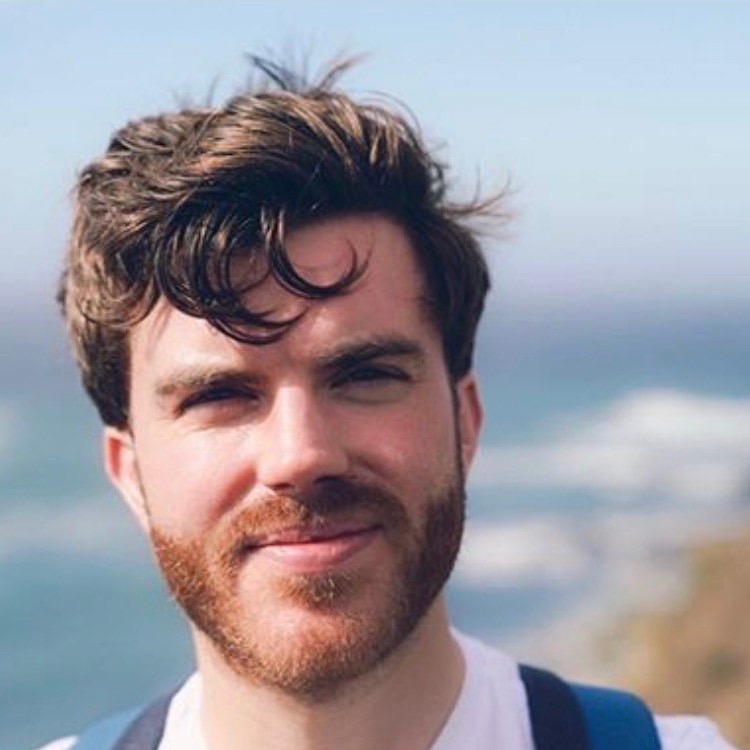

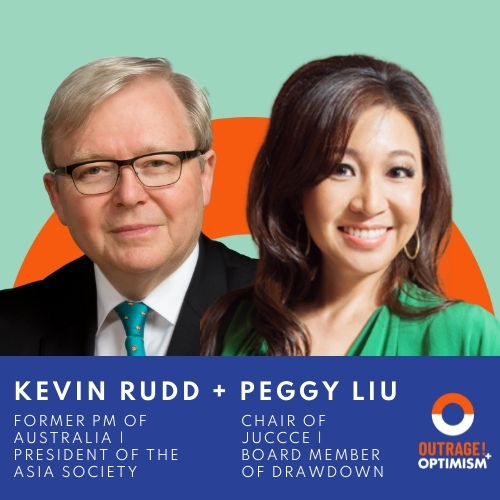
.jpg)
